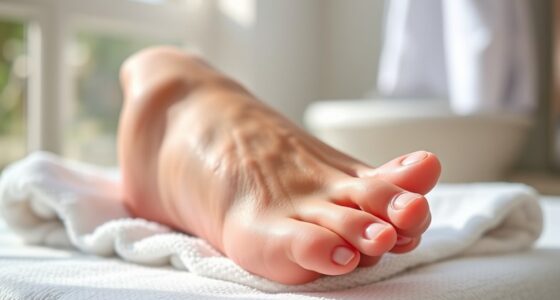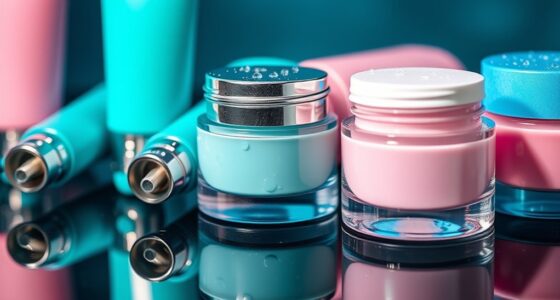To maintain good oral, skin, and daily hygiene as an elderly person, focus on consistent routines like brushing twice daily with fluoride toothpaste, flossing, and visiting the dentist regularly. Care for your skin by keeping it clean, moisturized, and protected from the sun. Clean your dentures daily and store them properly to prevent damage. Proper hygiene supports overall health and well-being; keep exploring to discover more tips for a healthy, comfortable life.
Key Takeaways
- Maintain a daily routine of brushing with fluoride toothpaste, flossing, and regular dental checkups to prevent oral health issues.
- Remove and clean dentures daily with non-abrasive cleaners; store in water or denture solution overnight.
- Practice gentle skin care with moisturizing, sun protection, and regular bathing to support skin health in aging adults.
- Use soft-bristled toothbrushes and avoid harsh chemicals to prevent skin and oral tissue irritation.
- Prioritize overall hygiene by washing hands regularly, maintaining oral hygiene, and using suitable skin products for sensitive skin.

Have you ever wondered why maintaining oral health becomes increasingly important as we age? As you get older, your mouth faces more challenges, making it essential to prioritize your oral hygiene routines. One of the key aspects is tooth decay prevention. Older adults are more susceptible to cavities due to factors like dry mouth, which reduces saliva production and leaves teeth vulnerable. To protect your teeth, it’s necessary to brush twice daily with fluoride toothpaste, as fluoride helps strengthen enamel and ward off decay. Flossing remains equally important because it removes plaque and food particles from between your teeth, areas that your toothbrush can’t reach. Regular dental checkups are indispensable, as they allow your dentist to catch early signs of decay or gum disease before they worsen. Additionally, cutting back on sugary foods and drinks can greatly reduce the risk of cavities. Staying hydrated and chewing sugar-free gum can also stimulate saliva production, providing natural protection against decay.
If you wear dentures, caring for them properly is just as essential as caring for your natural teeth. Denture care tips include removing your dentures nightly to give your gums a rest and prevent bacterial buildup. Clean your dentures daily with a soft brush and non-abrasive cleaner designed specifically for dentures. Avoid using regular toothpaste, which can scratch the surface and harbor bacteria. Rinsing dentures thoroughly after meals removes food debris and prevents stains. When not in use, store your dentures in water or a denture-cleaning solution to keep them from drying out or warping. Regularly inspecting your dentures for cracks or damage is important, and if you notice any issues, see your dentist promptly. Proper denture fit is also essential; ill-fitting dentures can cause irritation, sores, and even infections. Your dentist can make adjustments to ensure a comfortable fit, reducing discomfort and improving functionality.
Taking care of your mouth as you age isn’t just about preventing cavities and maintaining a bright smile; it also contributes to overall health. Good oral hygiene helps prevent infections that could impact your heart or other parts of your body. Maintaining a holistic approach to health, including oral care, is essential for aging well. Remember, your daily routine should include brushing, flossing, and regular dental visits. For denture wearers, consistent cleaning and proper storage make all the difference. By following these simple yet effective denture care tips and focusing on tooth decay prevention, you’ll preserve your oral health, comfort, and confidence well into your later years.
Frequently Asked Questions
How Often Should Elderly Individuals Visit the Dentist?
You should visit the dentist at least twice a year to maintain good oral health. Regular check-ups help address dental anxiety early and allow for preventive measures like fluoride treatments. If you notice any issues or experience discomfort, don’t wait—schedule an appointment sooner. Consistent visits guarantee your teeth stay healthy, and your dentist can tailor treatments to your needs, making your dental care routine comfortable and effective.
Are Electric Toothbrushes Safe for Seniors With Limited Dexterity?
You might wonder if electric toothbrushes are safe for seniors with limited dexterity. The good news is, they generally are, but you should choose models designed with safety features like smaller handles and gentle vibrations. These features help address senior dexterity concerns, ensuring effective cleaning without risking injury. Always consult with a dentist first, and consider adaptive toothbrushes to make brushing easier and safer for your loved ones.
What Are Signs of Oral Infections in the Elderly?
You should watch for signs of oral infections, like gingivitis symptoms such as red, swollen gums or bleeding during brushing. Oral pain, persistent bad breath, or pus around your teeth are also key indicators. If you notice these symptoms, it’s important to see a dentist promptly. Early detection helps prevent the infection from worsening and guarantees you maintain good oral health as you age.
How Can Dry Mouth Be Effectively Managed?
To manage dry mouth effectively, you should use saliva substitutes to keep your mouth moist and comfortable. Stay well-hydrated by drinking water regularly throughout the day, and avoid caffeine or alcohol which can worsen dryness. Chewing sugar-free gum or sucking on lozenges can stimulate saliva production. Incorporate hydration strategies into your daily routine to reduce discomfort and protect your oral health.
Are There Special Toothpaste Recommendations for Seniors?
Yes, you should choose a senior toothpaste designed for gentle oral care. Look for formulas that are fluoride-rich but free of harsh abrasives, which can damage delicate enamel. These toothpastes often contain ingredients to soothe dry mouth and reduce sensitivity. Using a senior toothpaste helps maintain oral health, prevents cavities, and guarantees a comfortable brushing experience, especially if you have sensitive gums or teeth.
Conclusion
Taking good care of your oral, skin, and daily hygiene is like tending a delicate garden—you need regular attention to keep everything healthy and vibrant. By staying consistent with your routines, you can prevent infections, boost your confidence, and enjoy a better quality of life. Remember, small daily efforts make a big difference over time, just like watering a plant helps it flourish. Prioritize your hygiene, and you’ll feel fresher and more comfortable every day.









